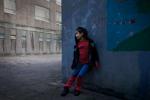
Mohammed est numéro un depuis 2001. Le
Prophète qui repose en terre saoudienne se réjouirait-il que son
nom soit le plus porté, qu'il s'étale, colonne après colonne, dans
le registre de naissances de la capitale de l'Europe? Mohammed arrive
en tête, devant Adam, Rayan, Ayoub, Mehdi, Amine et Hamza.
Un modèle de dévotion, de vertu et de
sagesse. Puisse notre fils marcher sur Ses traces. Vu pieux, rude
réalité. Ce n'est pas si évident. Les enquêtes révèlent que
Mohammed est souvent un citoyen de seconde zone dans le pays qui a
accueilli ses parents comme travailleurs immigrés.
Est-ce de sa faute? C'est son père qui
est venu ici, quoique à moitié seulement. Dans sa tête, l'homme
n'a pas oublié son village. Il a endossé une double identité: pour
ceux qui étaient restés au pays, celle d'un héros lointain et
prospère, et pour sa progéniture et son épouse, qu'il a
contraintes au voyage, celle d'un être habité par la nostalgie,
parfois en décalage. Le père était mal armé pour faire face aux
nouveaux temps et aux nouvelles murs. Il n'avait pas non plus
beaucoup à donner aux autres. À l'exception du gîte et du couvert,
on n'a jamais attendu cela de sa part.
Mohammed est donc venu au monde plus nu
que les autres, déraciné, sans autre promesse de grandeur qu'un nom
qui sonne un peu bizarrement. "En deuxième année primaire, un
cinquième des allochtones accusent un retard linguistique qu'ils ne
parviennent en général plus à rattraper", révèle une étude
universitaire. Mohammed paie les pots cassés. Il est rapidement
orienté vers l'enseignement technique et professionnel, même si ses
compétences cognitives le prédestinent à devenir ophtalmologue, et
non plombier.
"Les élèves allochtones ont
tendance à se renfermer sur leur groupe ethnoreligieux, lit-on,
alors qu'une étude révèle que s'ils fuient le repli identitaire,
ils multiplient par deux leurs chances de réussite à l'école et
dans la vie."
Mais comment s'y prendre? Mohammed,
l'ombre du Prophète, est un jeune garçon sans patrie, un citoyen
plus souvent conspué qu'enlacé. Comment avez-vous dit que vous
appeliez ? Le propriétaire de l'appartement a l'air moins
bienveillant quand il a un Mernissi au lieu d'un Mertens au bout du
fil. Mohammed a passé sa jeunesse à Molenbeek, l'homme a fait
l'amalgame avec le Maroc et a d'emblée entrevu les problèmes, le
jacassement des hordes familiales, les moutons égorgés sur les
balcons étroits, les envolées vocales d'Oum Kalsoum à des heures
indues. Désolé, cet appartement au deuxième étage n'est plus à
louer. Le bail vient d'être signé avec un locataire.
Penchons-nous sur les études relatives
à la discrimination à l'embauche. Plus souvent qu'à son tour,
Mohammed s'entend signifier que le poste est déjà pourvu, alors
que Laurent sera encore convié à un entretien une semaine plus
tard.
Ah, tout ça, ça dépend de vous,
lance Mohammed. Il se convainc qu'il va décrocher un diplôme
universitaire et démentir tous les clichés. Je serai le premier
docteur marocain de ma rue à Bruxelles. Vous verrez. Oui, les
garçons avec qui j'ai grandi me traitent de tapette, de traître.
Mais cela ne m'empêche pas de dormir. Que nenni. Ils viendront
bientôt faire la file dans ma salle d'attente.
Un peu plus tard, le jeune homme n'a
pas le moral. Il n'est pas facile, pour un Mernissi, de devenir
copain avec un Mertens. Mais je persévère, ça finira bien par
arriver. Mohammed soupire.
Puisse notre fils connaître la
liberté, puisse-t-il marcher sur Ses pas, comme les premiers pas sur
la neige fraîche.
Categorie:Articles en français
|
